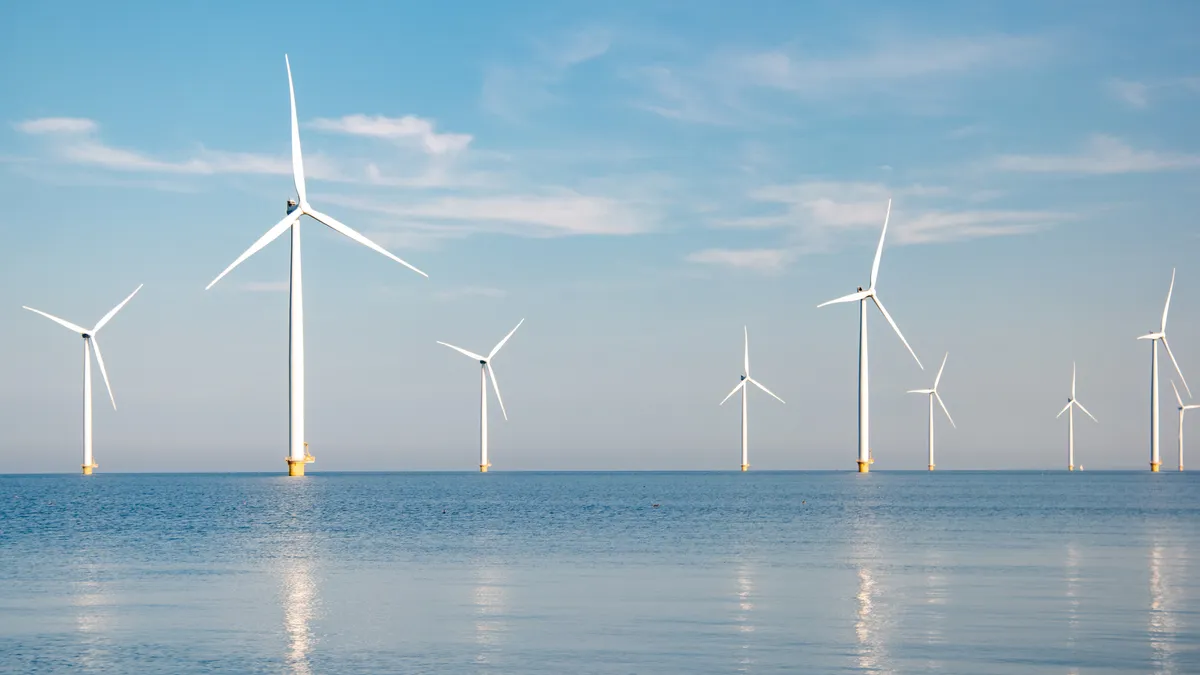Dive Brief:
- GE Vernova, the manufacturer and installation contractor for the Vineyard Wind turbine blade that broke apart Friday, suspects the blade “experienced a manufacturing deviation – in this case, insufficient bonding,” a company spokesperson said Wednesday.
- “The quality assurance program should have identified” the issue with the Haliade-X turbine blade, the spokesperson said – but so far, “there is no indication of an engineering design flaw in the blade.”
- GE Vernova’s initial environmental analysis of the incident, completed by consulting firm Arcadis US, found that debris from the blade poses a risk of injury to those who encounter it, but contains only inert material.
Dive Insight:
The blade failure resulted in debris, including chunks of fiberglass, falling into the ocean around Nantucket and washing onto the shore over the following days. The U.S. Bureau of Safety and Environmental Enforcement has issued a suspension order to halt construction and operations at the wind farm.
GE Vernova said its initial analysis found “no indication of an engineering design flaw in the blade or information connecting this blade event to the blade event we experienced” at the U.K.’s Dogger Bank Wind Farm, which is also using Haliade-X turbines. That blade failure was caused by an installation error, the company said.
During a Wednesday earnings call, GE Vernova CEO Scott Strazik said the company plans to use “non-destructive testing – think ultrasound, think a radiologist, but for a blade” to check the other 150 blades that were manufactured at the same Gaspé, Canada, facility where the manufacturing deviation occurred.
“Structurally, [turbines are] designed and certified to not do that, but you can't guarantee that there won't be a manufacturing defect in a blade,” said Theodore Paradise, a partner at K&L Gates who practices energy, infrastructure and resources law.
Paradise said he doesn’t consider the Vineyard Wind blade failure to be a “catastrophic” event, but noted that public perception of the incident has been very negative, in part because “it's something, certainly, for [offshore wind] opponents to seize on.”
Vineyard Wind communications director Craig Gilvarg said in a statement that Vineyard Wind is aware of GE Vernova’s preliminary findings, and while the company continues its investigation, “Vineyard Wind 1 remains focused on coordinating with [BSEE], assisting in the recovery of debris, and prioritizing the safety of personnel, local communities, and the environment.”
Arcadis US’s report found “no PFAS containing materials used in the manufacture of the blade itself or in the foam, fiberglass, wood or coating,” but noted that “multiple small Aerodynamic add-ons attached to the root end of the exterior of the blade” contain PTFE, also known as Teflon – a PFAS chemical.
However, the report adds, “PTFE is a large molecular weight material that is highly stable and won't degrade under typical environmental processes …. [EPA] does not regulate PTFE like it does other smaller molecular weight PFAS and the material is approved by the FDA for use in contact with food, potable water, and pharmaceutical products.”
Going forward, Arcadis US recommended GE Vernova continue debris recovery, perform an inventory of debris recovered so far, and expand the existing conceptual site model “consistent with standard planning and assessment activities for human health and ecological risk assessments, in terms of potential current and future receptors, exposure routes, and pathways” for the debris.
In a 10-Q filing with the U.S. Securities and Exchange Commission, GE Vernova said the company doesn’t have an indication of when the BSEE will modify or lift the suspension order. To date, the company has installed 24 of the project’s 62 turbines, and Vineyard Wind is due to complete construction later this year.
“Under our contractual arrangement with the developer of Vineyard Wind, we may receive claims for damages, including liquidated damages for delayed completion, and other incremental or remedial costs,” the 10-Q states. “These amounts could be significant and adversely affect our cash collection timelines and contract profitability.”
GE Vernova said it is “currently unable to reasonably estimate what impact the event, any potential claims, or the related BSEE order would have on our financial position, results of operations and cash flows.”
Paradise said the incident “feels like a big negative” for offshore wind — “a blow to the industry of some bad press at a time when it's really looking for wins and good press.”
“I think this is human psychology to some degree,” he said. “Those wins, those good developments and positive things, tend to get less discussion and less of a spotlight as opposed to something going wrong – whether it was inflation or interest rates, or now the blade failure at Vineyard. So I think it has kind of an outsized impact in terms of the mood of the industry.”
Separately, Vineyard Wind faces a lawsuit in the U.S. Court of Appeals for the First Circuit challenging the Biden administration’s approval of the project, with oral arguments scheduled to take place Thursday.















